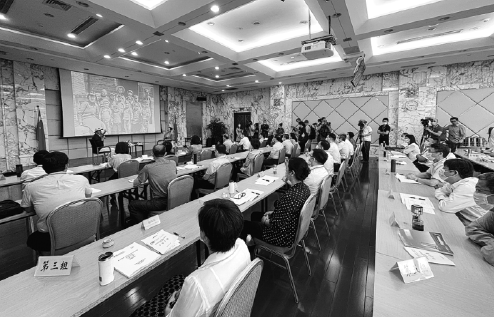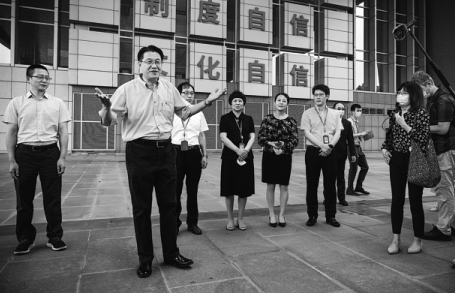Leaders for tomorrow
Pudong academy provides valuable experience to those ready to serve, Yang Feiyue reports.

Er Dongqiang was giving a lecture to a group of special students at the China Executive Leadership Academy Pudong in Shanghai in mid-June.
The professional photographer, who is also director of the Shanghai Association of Historians, shared tales of his journey along the Silk Road with a classroom of government officials from across the country.
"I used to love watching sailboats along the Huangpu River, and I dreamed of traveling the world when I was growing up," Er says.
His dreams have come true and he has set sail to many places over the years.
"I feel that in the wide area of the South China Sea, Chinese culture is a huge presence," he says.
Er shared details of his journeys across Eurasia, into countries along the Silk Road since 2000, with the class, as well tales of embarking on a trip in an unpowered sailboat in 2013 to countries along the Maritime Silk Road.
"I have been to many ports, where there are many old captains and their boats, as well as their endless attractive and adventurous stories," Er says.
"I hope there will be a Chinese captain in the future to tell the Chinese stories."
Er has accumulated a number of valuable documents and a great deal of knowledge about the Belt and Road, taking delight in sharing his experiences, and gladly accepting an invitation by the Pudong academy.
Chinese boats of course have had wind in their sails from seven seas. For example, in the 1840s, the Chinese merchant ship Keying sailed to New York and London, and was visited by Queen Victoria, Er says.
Liu Lixin, deputy director of the Jilin provincial publicity department, was inspired by Er's lecture.
"I feel proud to see how decades of development, especially since the reform and opening-up, can be fully reflected by an individual (experience) in Shanghai," Liu says.
She says the lecture enabled her to see the positive changes brought about by the work of the Communist Party of China.
Liu says the lecture has encouraged her to be bolder in introducing China to the outside world, much of which still doesn't quite understand the country, even now.
"We should go out and boost cultural integration of all ethnicities and nations," Liu says.
She says she will work to spread the culture, and innovatively promote Jilin's Changchun Film Studio, which was the first of its kind since the founding of New China in 1949, as well as the China FAW Group Corp, one of the first modern industries introduced to the province.
Liu also visited the historical site where the First National Congress of the Communist Party of China was held and went to the Pudong New Area to see and learn about positive development during her training at the academy.
"Jilin is a northeastern province and I feel we have a lot to learn from Shanghai, which has been at the forefront of both economic and culture development," Liu says, adding that she will focus more on public cultural service when she goes back to work.
The China Executive Leadership Academy Pudong is a national institution in leadership training and development. It was approved by the Central Committee of the CPC and State Council and opened in 2005.
The academy is equipped with modern facilities for teaching, administration and holding conferences. It boasts an expansive library, sports and student residences, accommodating more than 800 full-time students for training. Students include senior and mid-level Party and government officials, high-level business executives, senior professionals, diplomats and military officers. It also offers tailor-made programs trusted by government departments, enterprises and social organizations from both home and abroad.
Its top-down courses mainly tackle the practices of China's reform and opening-up policy, focusing on urbanization and urban modernization, the development of the Yangtze River Delta and modern financial management and innovation.
"Our Party and government administration training is actually evolving with the changes to domestic and international situations," says Mao Xinya, a professor at the teaching experiment and case development center of the academy.
The fact that the outside world is paying more attention to China means skills such as communication are all the more important for Party and government officials at all levels, Mao says.
"So we will also arrange more practical courses for foreign exchange and communication."
Mao has been teaching the intricacies of the pilot free trade zone and economic integration of the Yangtze River Delta at the academy since 2006.
"I feel the students are getting younger and their diplomas are increasingly high," she says.
Students will also come to Mao with issues from work and discuss them with her via WeChat after class. Mao says it has prompted her to strengthen real-case studies and find discipline in practice and theorize it.
"I think it's a very important mission for a teacher at this State-level academy to build a bridge between practice and theory," Mao says.
Normally, training lasts for 10 to 14 days, but communication between students and the faculty members continues afterwards.
Wang Shiquan has been teaching communications at the academy since its opening. He is director of the teaching experiment and case development center. His expertise covers publicity crisis management, external communication and leadership development.
"We encourage them (students) to learn from, and open up to, foreign reporters," Wang says.
Students have hammered home to them the importance of telling the truth and apologizing when accidents happen during such occasions as news conferences.
Wang has given training to about 80,000 students over the years and he says he is seeing positive changes.
"I see them putting what they've learned into practice after going back (to work)," he says.
Although the overall communication skill of Chinese officials has improved significantly, Wang says it's important to continue the work, since there are still a lot of longstanding cultural differences.
The academy has made a point of strengthening international communications.
"We have invited many foreign teachers and international faculty members," Wang says.
His Majesty King Willem-Alexander of the Netherlands, former president of South Africa Jacob Zuma and former French prime minister Dominique de Villepin have all made speeches at the academy.
Joseph Nye, former dean of Kennedy School of Government, Harvard University, and Henry Mintzberg, professor of Management Studies at McGill University, have given lectures.
"We will definitely strengthen (international cooperation) after the pandemic," Wang says.
In addition to classroom study, the academy has selected more than 300 spots for field trips in the Yangtze River Delta region, a key area in China's reform and opening-up. It has established six labs to simulate media communications, crisis management, leaders' psychological adjustment, financial innovation, smart city management and Party education. Through these labs, participants can enhance their leadership capacity by exchanging ideas of how to handle similar cases and crises in real life.
At the Artificial Intelligence Pavilion of Zhangjiang Future Park, about 20 minutes' drive from the academy, students get an insight into one of the country's most pioneering areas of research.
Yuan Liang, vice-mayor of Zibo, Shandong province, was impressed by the approximately tripled efficiency of innovative drugs research and development at the Artificial Intelligence Pavilion.
The field trip to the pavilion was part of his training at the academy.
Since Zibo is an important health and medicine cluster, Yuan says he would like to see if relevant technology could be applied to local industry and explore the possibilities of AI application in smart plants and production lines.
"The courses (from the academy) are forward looking and very international," he says.
"I want to apply these methods and standpoints to both my science and technology work and market management work."



Today's Top News
- CPC leadership meeting urges steadfast implementation of eight-point decision on improving conduct
- Autumn grain purchases exceed 200m tons in China
- Wang to meet foreign ministers of Cambodia, Thailand in Yunnan
- China's top legislature concludes standing committee session
- Thailand and Cambodia agree to temporary ceasefire
- NPC's 4th annual session slated for early March






























